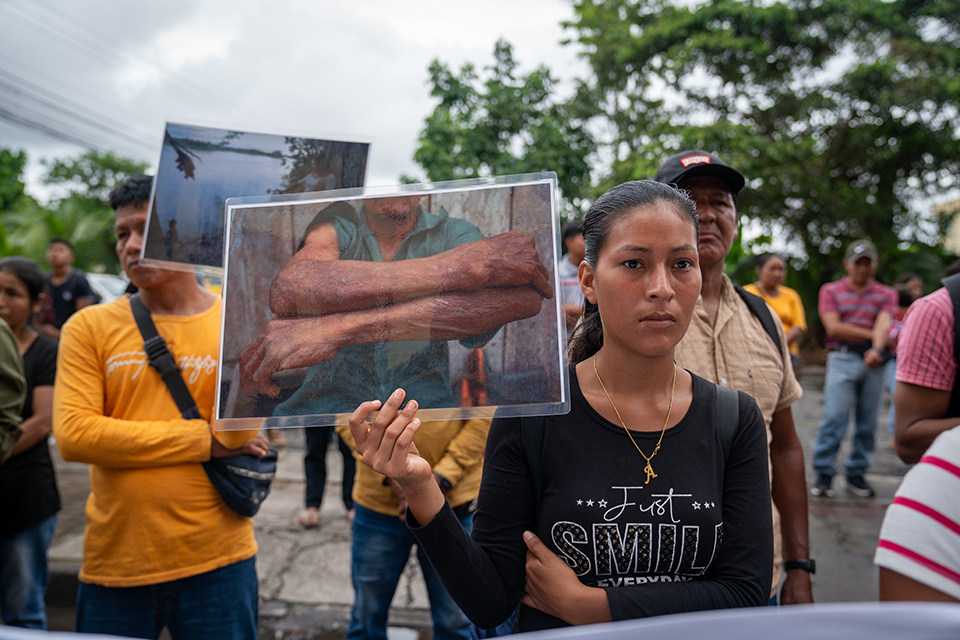

El Coca, Ecuador – June 30, 2025 — In the absence of justice and an intercultural dialogue with the Kichwa communities affected by the 2020 oil spill in the Coca and Napo rivers, around 120 people, among them elders, women, children, and youth, held a protest in front of the Provincial Court of Francisco de Orellana.
To demonstrate that long-lasting contamination is still present in the water and soil of the region’s affected areas five years later, the plaintiffs presented physical evidence, including water samples, dead plants, and soil contaminated with hydrocarbon residues.
This action is a direct response to the reactivation of the landmark case of the April 2020 spill, considered one of the worst environmental disasters in the Ecuadorian Amazon in the last decade. The rupture of two oil pipelines (SOTE and OCP) and one multipurpose pipeline resulted in more than 15,800 barrels of crude spilling into the Coca and Napo Rivers1. Over 120,000 people were affected, including 27,000 Kichwa living along the riverbanks. Not a single barrel was recovered.
On September 19 and 20, 2020, during a field inspection of six riverside communities, authorities discovered toxic pollutants, including polycyclic aromatic hydrocarbons and heavy metals such as nickel, lead, and vanadium. Their levels exceeded safety standards and proved highly toxic to both humans and the environment. The oil spill affected the health of the community members and contaminated drinking water, soil, crops, air, and wildlife.
A study that analyzed 50 years of oil spills in Ecuador2 highlights that the principal risks and effects of oil spills include: direct contact with wildlife, which affects the skin, mucous membranes, and directly impacts vital organs such as the liver and lungs, in addition to causing the direct death of animals due to water contamination and soil damage. Oil spills in water are more harmful because heavy metals enter the food chain and bioaccumulate, and salinity remains in the soil, limiting plant growth and affecting the microbial community. Water contamination is also the main pathway for the spread of pollutants. Furthermore, local communities exposed to pollution related to the oil industry have shown a higher incidence of cancer, malformations, significantly greater in newborns, and psychological disorders due to exposure to heavy metals.
Yet, judges refused to deliver justice in the first filing of the lawsuit and its appeals, arguing that there was no longer evidence of the damage caused by the 2020 oil spill. Then, in November 2024, the Constitutional Court annulled both rulings and ordered a new judicial process that would include a genuine intercultural dialogue with the affected communities.
Clemente Paz, the judge assigned to the case, from the Provincial Court of Francisco de Orellana, initially scheduled the meeting for June 30, 2025, in the city of Coca. From the outset, the Federation of United Communes of the Kichwa Nationality of the Ecuadorian Amazon (FCUNAE) and the Kichwa communes repeatedly requested that the dialogue take place in their territory, as required by the principle of interculturality. However, this week, the judge announced that the hearing would be postponed until July 25 and, without any justification, denied the request to hold it in the affected Indigenous territory.
Kichwa leaders argue that holding the dialogue on their land is crucial: The plaintiffs must be heard in the place where they have lived with the various and continuous impacts of oil contamination from April 2020 to the present—impacts that pose an ongoing threat to the health of Kichwa families, the rivers, and the forest.
Oil spills are not caused by unforeseen circumstances. They are preventable. Despite this, the companies OCP Ecuador S.A. and EP Petroecuador continue to fail to take preventive and rapid response measures, demonstrating their disregard for the lives of thousands of families and nature. Their negligence was made clear again on June 16, when another 3,000-barrel spill occurred in the Reventador region.
Community leaders, plaintiffs, victims of contamination, Indigenous youth from other nationalities, human rights defenders, and representatives of social organizations, including Amazon Frontlines, joined the call to demand that the judicial process adhere to the principles of due diligence, intercultural justice, and full reparation.
For more information, read the briefing document here
Media Contacts:
Vivian Idrovo – Alianza por los Derechos Humanos Ecuador
+593 93 928 7754 / alianzaddhh.ecuador@gmail.com
Luis Andy – President, FCUNAE
+593 96 755 9207
Luisana Aguilar – National Press Coordinator, Amazon Frontlines
+593 99 924 0129 / luisana@amazonfrontlines.org
1 Alianza por los Derechos Humanos Ecuador. 2020. Inspection report on communities affected by the April 7, 2020 oil spill. Read the report
2 Rivera-Parra et al. 2020. Spatial distribution of oil spills in the northeastern Ecuadorian Amazon.Biological Conservation, Volume 252. Read the study




